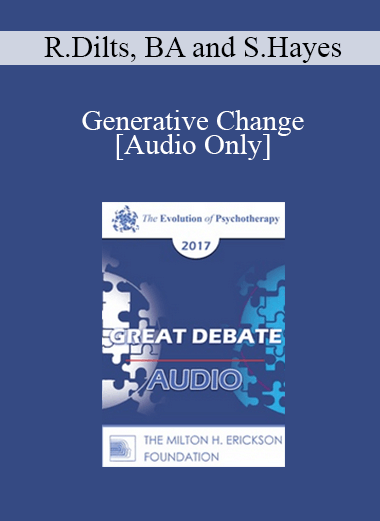- Topic Areas:
- Great Debates | ACT | Neuro-Linguistic Programming
- Category:
- Evolution of Psychotherapy | Evolution of Psychotherapy 2017
- Faculty:
- Robert Dilts, BA | Steven Hayes, PhD
- Duration:
- 1:25:57
- Format:
- Audio Only
- Original Program Date :
- Dec 14, 2017
Description
Description:
Generative processes are those that promote innovation, evolution and growth. To “generate” means to create something new. Thus, the core focus in of generative change is creativity: How do you create a successful and meaningful work life? How do you create great personal relationships? How do you develop a great relationship with yourself—your body, your past, your future, your wounds and your gifts? These are the basic challenges in leading an extraordinary life, and the processes of generative change offer a way to succeed at them.
Educational Objectives:
- Define the process of generative change and how it differs from corrective change.
- Describe the importance of transforming obstacles as key to generative change.
- Explain the role of different levels of change in the process of generative change.
*Sessions may be edited for content and to preserve confidentiality*
Credits
Faculty

Robert Dilts, BA Related seminars and products: 94
Robert Dilts, has been a developer, author, trainer and consultant in the field of Neuro-Linguistic Programming (NLP) – a model of human behavior, learning and communication – since its creation in 1975 by John Grinder and Richard Bandler. A long time student and colleague of both Grinder and Bandler, Robert also studied personally with Milton H. Erickson, M.D., and Gregory Bateson.

Steven Hayes, PhD Related seminars and products: 28
Steven C. Hayes, Ph.D Clinical Psychology, West Virginia University, Morgantown, is a Foundation Professor of Psychology at the University of Nevada. An author of 44 books and nearly 600 scientific articles, he is known for his work on Acceptance and Commitment Therapy, a widely used and researched method of psychological and behavioral intervention, and Relational Frame Theory, a comprehensive empirical research program on human language and cognition. Dr. Hayes has received the Lifetime Achievement Award from the Association for Behavioral and Cognitive Therapy, and is among the most cited psychologists in the word.
Reviews







